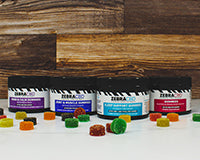
In 2018, the United States government federally legalized a compound called CBD. The acronym stands for cannabidiol, and the substance comes from hemp plants. Unlike marijuana plants, which produce the common psychoactive compound, tetrahydrocannabinol (THC), hemp does not cause mind-altering effects.
Rather, legally, it contains no more than 0.3% THC, meaning it’s safe to consume and is unlikely to show up on a drug test.
As CBD has become more popular within the United States, products have expanded from CBD oil to other CBD-infused products, such as CBD topical lotions, CBD pills and CBD gummies.
What are CBD gummies? Put simply, CBD gummies are a delicious and convenient way to consume CBD — they’re often flavored and typically take less time to release within the body. Below, we take a deep dive into everything you need to know about CBD gummies.
What is CBD?
To understand CBD gummies and other edibles, we must first understand CBD. CBD is a cannabinoid, which consists of a group of related compounds that are found in the cannabis plant — which includes both hemp and marijuana plants.
According to research, there are between 80 and 100 cannabinoids in cannabis plants, alongside 300 non-cannabinoid chemicals. The primary cannabinoids are CBD and THC.
Cannabinoids are believed to interact with certain receptors in our brains and bodies to deliver their desired effects. These receptors exist within the endocannabinoid system, which is largely responsible for maintaining homeostasis throughout the body, such as appetite, energy expenditure and blood pressure.
The system consists of endocannabinoids, which are neurotransmitters that bind to cannabinoid receptors.
There are two types of cannabinoid receptors found within the endocannabinoid system:
- CB1 – These receptors are primarily found on the nerve cells of the brain and spinal cord, but they also exist in some organs and tissues, including the spleen, white blood cells, the endocrine gland and certain parts of the reproductive, gastrointestinal and urinary systems. When cannabinoids enter your body, they interact with these receptors to influence memory functioning, physical sensation and motor control.
- CB2 – These receptors are mainly found on white blood cells, as well as the tonsils and the spleen. Since the majority of CB2 receptors exist within the immune system, interactions with these receptors is believed to impact inflammatory and immune functions.
When we eat CBD gummies, the cannabinoid can interact with each of these receptors to deliver a bevy of potential benefits, which include:
- Stress relief – After a long day, adding a few CBD gummies to your post-work/night routine may help ease your mind and body and help transition you into a calmer state.
- Sleep – In a similar vein, CBD gummies like our CBN sleep gummies can help you fall asleep and stay asleep longer, providing feelings of peace and relaxation. In general, CBD is considered to be one of the more effective natural sleep remedies.
- Physical comfort – It’s common to feel tight, stiff or achy after a strenuous workout or a grueling day at the office. To combat body aches, CBD may help lower feelings of physical discomfort and reduce inflammatory responses that may cause unwanted soreness and swelling.
- Improved moods – Since CB1 receptors are located in the brain, it’s believed that CBD use may be able to relieve feelings of stress and sadness that may debilitate you throughout the day.
Is CBD Harmful?
Generally, CBD use is safe. However, depending on a product’s particular CBD potency and how your body reacts to the compound, you may experience some unwanted, though not dangerous, side effects. These can include:
- Diarrhea
- Sleepiness
- Fatigue
- Weakness
- Rash
- Decreased appetite
To ensure that your body reacts positively to the CBD of your choice, pay attention to expert recommendations. As of 2023, the U.S. Food and Drug Administration (FDA) has approved only one CBD medication (for an unregulated brain condition).
You can follow their intake recommendations for said drug, which states that patients should consume 2.5 milligrams of CBD per kilogram of body weight twice daily. After one week of monitoring how the CBD impacts your body, you can increase the dosage to 5 milligrams per kilogram of body weight twice daily.
All that said, CBD products like CBD gummies are not regulated by the FDA, and some studies determine that it may be safe to start with 20 to 40 milligrams of on-the-market CBD a day.
Ultimately, your CBD dosage will depend on your unique body composition, your body weight, the reason you’re taking CBD and the concentration of the CBD gummy.
For example, people with higher body weights may need a higher CBD dosage to fully feel its potential effects.
Generally, however, it’s recommended to start with a lower concentration of CBD and monitor how it impacts your body before increasing your dosage.
How to Choose a Safe CBD Product
Because CBD products are unregulated by the FDA, it’s essential to pay attention to the products you’re buying. It’s likely that some unreputable businesses may sell CBD products that contain unlawful amounts of THC or contaminants, such as heavy metals and pesticides.
Fortunately, there is a way to validate the legitimacy of the company and its products. Whether you’re shopping for CBD online or in-store, you can access each product’s Certificate of Analysis (COA). A COA is a report from an accredited, third-party lab that tests the product.
Within the COA, the lab will detail the following:
- Cannabinoid profile
- Weight percentage of each cannabinoid
- Concentration of each cannabinoid
- Heavy metal analysis
- Pesticide analysis
When you look carefully, the COA can tell you three things: THC content, label accuracy and quality. If the product contains more than 0.3% THC, it’s considered an illegal product, and thus, the manufacturer may be an untrustworthy source of CBD. Moreover, the cannabinoid profile can help you cross-reference whether what they’re advertising on the label is accurate and ensure it’s a quality batch.
Zebra CBD takes it a step further. We provide a downloadable COA for each of our products, so you can feel good about what you’re putting in your body.
CBD Gummies vs. CBD Pills
Both CBD gummies and CBD pills are edible forms of CBD. In a Statista survey, it was found that 58% of consumers prefer CBD gummies, with CBD pills being the second preferred CBD edible choice.
So, what makes the difference?
While both CBD products must pass through the digestive system, it’s believed that CBD gummies may be more bioavailable than the pill alternative. Bioavailability refers to how much of a substance is absorbed by the body and takes active effect.
In the case of CBD gummies, consumers first chew the gummy before passing it through the digestive system. It’s in the mouth where CBD gummies take their lead. Under the tongue, there’s a semi-permeable barrier that can easily diffuse CBD through its walls and directly into the bloodstream.
You may be wondering, ‘How long does it take for cbd to work?’ While the answer depends on a few factors, it’s believed that CBD gummies may take effect faster than CBD pills, which must also be broken down by the stomach and later absorbed into the bloodstream via the small intestine. It can also be more difficult for the digestive system to break down the outer coating of CBD pills.
In terms of advantages, CBD gummies are considered to be convenient and versatile. They come in a variety of potencies, they’re easy and delicious to consume and they’re available in full spectrum CBD, broad spectrum CBD and isolate CBD varieties.
Alternatively, CBD pills contain precise dosing and they may deliver longer-lasting effects since it takes longer for the body to break down pills.
CBD Gummies vs. CBD Tinctures
Like CBD pills and CBD gummies, CBD tinctures are an edible form of the cannabinoid. CBD tinctures, however, are the most bioavailable of the bunch.
CBD oil, when placed under the tongue, does not need to pass through the digestive system before they take effect. Rather, it’s delivered directly to the bloodstream via the aforementioned barrier under the tongue. That said, you can also swallow CBD tinctures; although, they’ll take longer to take effect.
Alternatively, if you’re seeking sustained effects, rather than a fast onset, CBD gummies may be the right choice for you. You can easily wind down with a CBD gummy and a cup of tea following a stressful day — and it may carry over into your sleep, too.
When looking for any CBD product, but particularly a CBD tincture, there are three varieties you can choose from:
- Full spectrum CBD– Full spectrum CBD contains all of the compounds found in the hemp plant. This includes the full profile of cannabinoids, as well as other substances like flavonoids and terpenes. Research suggests that these compounds can work together to heighten the effects of CBD in what’s called the “entourage effect.”
- Broad spectrum CBD– Broad spectrum contains every cannabinoid, terpene and flavonoid found in hemp, except for THC. It’s entirely free of the psychoactive compound, making it a good choice for those looking to avoid mind-altering effects.
- CBD isolate – CBD isolate is a pure form of CBD, meaning it contains no other cannabinoids, flavonoids or terpenes.
Find High-Quality CBD Gummies at Zebra CBD
CBD gummies are a tasty and convenient way to add CBD to your health and wellness routine. And at Zebra CBD, we offer full spectrum, vegan, soft-chew CBD gummies in three natural citrus flavors.
Each gummy contains approximately 25 milligrams of CBD, and with our subscription package, you can receive your CBD gummies to your door every 60 days.
Discover the potential benefits of Zebra CBD’s premium CBD gummies for sale today.
Sources:
- ADF. What are cannabinoids? https://adf.org.au/drug-facts/cannabinoids/
- News Medical. Cannabinoid Receptors. https://www.news-medical.net/health/Cannabinoid-Receptors.aspx
- Harvard Health Publishing. Cannabidiol (CBD): What we know and what we don't. https://www.health.harvard.edu/blog/cannabidiol-cbd-what-we-know-and-what-we-dont-2018082414476
- The New York Times. What Are the Benefits of CBD? https://www.nytimes.com/2019/10/16/style/self-care/cbd-oil-benefits.html
- Medical News Today. How much CBD should you take? https://www.medicalnewstoday.com/articles/327518
- Sttark. What is a CBD Certificate of Analysis and How to Read One? https://www.sttark.com/blog/what-is-a-cbd-certificate-of-analysis-and-how-to-read-one
- Statista. Preferred cannabidiol (CBD) products in the United States as of 2022. https://www.statista.com/statistics/1182718/leading-reasons-why-american-adults-use-cbd/
- Medical News Today. Full-Spectrum vs. Broad-Spectrum CBD: What is the Difference? https://www.medicalnewstoday.com/articles/full-spectrum-cbd-vs-broad-spectrum-cbd#differences









